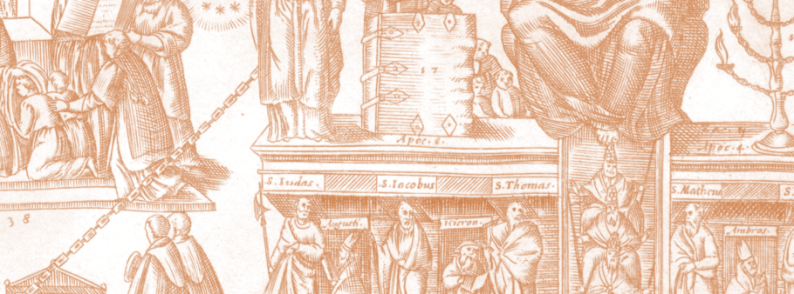Event
The Catholic Reformation and the Book
This two-day virtual conference invites scholars to examine the interactions and mutual influences between the Catholic Reformation and the printed book.

Histories of printing and religious controversy in early modern Europe usually focus on the powerful impetus supplied by the development of print to the spread of Protestant movements.
In contrast, book production that set out to promote Roman Catholic ideas and values has not attracted the same degree of scholarly interest, despite the fact that the Catholic Reformation counts among the most powerful of the factors that shaped not only the religious and political but also the cultural history of Europe after the Council of Trent. The defenders of the old ways were well aware of the far-reaching consequences, both potentially beneficial and detrimental, of the invention of the printing press for their cause. This consciousness gave rise to many and varied solutions: from the Index librorum prohibitorum, through the reform of liturgical books, to the systematic provision of cheap devotional reading matter in the vernacular.
The aim of the conference is to stimulate discussion on the uses of the printed book by Roman Catholics and the role of this medium in the consolidation of opposition to the message of the Protestant Reformation and the implementation of Tridentine reforms. We hope to bring together book historians, archivists, literary scholars, and librarians to explore how the Catholic Reformation used printed matter as a vehicle for ideas, and what influences the movement exerted on European book markets and book cultures.
Both case studies and more general overviews are welcomed. Possible topics include, but are not limited to:
- developments in international and local markets (manufacturing and distribution of the Catholic book, the role of major centres and peripheries);
- new audiences (printed matter as a pastoral and missionary tool, popular devotion);
- inter-confessional exchanges (controversy and polemic, inspirations and imitations, common areas of Christian heritage and tradition);
- the book in the life of religious orders and organizations;
- the cultural impact of post-Tridentine printing (new genres, their authors and readers, the shaping of new publishing conventions);
- censorship and legal regulations;
- typography and book aesthetics;
- bibliographic evidence and archival sources;
- big data and bibliometric research.
We hope to publish a peer-reviewed volume based on the conference contributions in the series ‘The Library of the Written Word’ by Brill.
The language of the conference will be English.
Please send paper proposals (paper title, an abstract of max. 300 words and a short bibliographical note) to Justyna Kiliańczyk-Zięba (justyna.kilianczyk-zieba@uj.edu.pl) and Magdalena Komorowska (magdalena.komorowska@uj.edu.pl) by 1 May 2021. You will be informed as to whether your proposal has been accepted by 15 June 2021.
Information
See also
Shaping new ways to open the book. A workshop of the HIRMEOS project
The HIRMEOS project (High Integration of Research Monographs in the European Open Science infrastructure), a project of the OPERAS research infrastructure (operas-eu.org) is organizing a workshop at the ELPUB conference in Marseille on 2 June on the topic of "Shaping new ways to open the book".
Władysław Reymont through the prism of film adaptations (Andrzej Wajda and others) - A lecture and multimedia presentation by Prof. Tomasz Żukowski
On June 8, Prof. Tomasz Żukowski will examine Reymont’s texts and their adaptations in the context of the discussion about how national history relates to the history of social groups and the conflicts between them. The lecture is presented in cooperation with the Institute of Literary Research of the Polish Academy of Sciences and is part of the Tadeusz Solowij Lectures of the Kosciuszko Foundation.
The Bourgeois Public Discusses Art III: Transnational Media, Mediators and Art Practices in Central Europe
This workshop seeks to explore the intricate relationship between the bourgeois public (Reinhart Koselleck, Jürgen Habermas) and literature and the arts, with a particular focus on the transnational role of the media, mediators and art practices in Central Europe from the late 18th century until the end of the 19th century.
Traumatic Modernities: From Comparative Literature to Medical Humanities / International Conference and Seminars
Organizers: